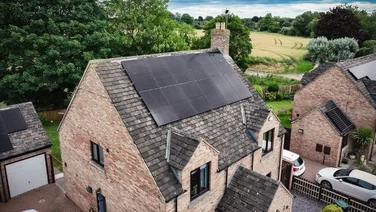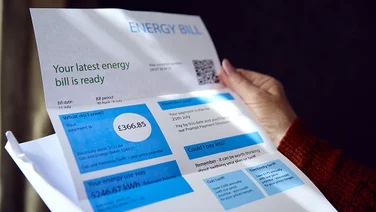- What does Wales think about climate change?
- What does Wales think about Just Stop Oil and Insulate Britain?
- What steps have Welsh households taken to improve energy efficiency?
- How aware is Wales of low-carbon technology?
- What does Wales think about solar panels?
- Why is Wales so climate conscious?
- Summary
Wales is the most climate-conscious region in the UK, according to our new National Home Energy Survey in 2023.
We surveyed 2,134 UK adults, asking a whole range of climate-focused questions — from whether they’d buy a property with solar panels and what they think of protest groups like Just Stop Oil, through to what steps people have taken to improve their home’s energy efficiency.
And Wales came top in all but one category, which is hugely impressive.
Read on to find out how Wales responded to our climate and low-carbon technology questions.

What does Wales think about climate change?

53% of people in Wales were either ‘extremely worried’ or ‘very worried’ about climate change, more than any other region in the UK.
This is likely because the last 12 months have brought the climate emergency into sharp focus, with Wales being one of many regions in the UK to break its maximum temperature record in 2022. It reached an astonishing 37.1°C, which really highlights how quickly our climate is shifting.
Extreme weather events have become more common in Wales over the past year too — the country experienced its first official drought since 2005 last year, with reservoirs and rivers drying up to force much of the region to ration water.
One in eight Welsh properties are at risk of flooding as well, so when the rains returned towards the end of 2022, parts of the country were unable to cope with the deluge of excess water.
It’s little wonder the majority of people in Wales are concerned about climate change then, and if weather patterns continue to deteriorate in 2023, the number of people concerned will almost certainly increase.

What does Wales think about Just Stop Oil and Insulate Britain?

The protest actions of Just Stop Oil and Insulate Britain have been big talking points over the past 12 months, and it’s clear their tactics haven’t been hugely popular. Wales however, is the region with the highest support for the two groups, with 24% in favour.
That still leaves the majority of people in Wales saying either ‘no’ or ‘I haven’t heard of them’, but the greater support aligns with the region being the most concerned about climate change.
It could be that the extreme weather events that occurred in Wales in 2022 have stirred support — both Just Stop Oil and Insulate Britain take the view that drastic situations require drastic solutions.
Overall however, their tactics are seen as genuinely disruptive. It’s what likely points to the low overall support for them, because a number of high-profile protests have led to ordinary people missing hospital appointments thanks to road blocks, for example.
What’s interesting is that the groups focused most of their attention in and around London, notably blocking the motorways connected to the capital. So you could say Wales has a higher support for their tactics because they’re not as directly affected by them.
Or they see the symbolism behind disrupting London as a statement against Westminster, who’ve been accused of dragging their heels on the climate issue.
Either way, it’s likely why 61% of the South East were against the protest groups, compared to just 42% of Wales.
What steps have Welsh households taken to improve energy efficiency?

62% of people in Wales have taken steps to improve the energy efficiency of their homes, the highest percentage in the UK.
This makes total sense when you consider the rising costs of energy bills over the last 12 months. The prices of electricity and gas skyrocketed as a result of Russia’s war against Ukraine, as well as post-pandemic increases in demand for energy.
Many people in Wales are likely aware that a more efficient home means less energy leaking out, which saves money on bills. Electricity in particular shot up from an average of 28p per kilowatt hour (kWh) in April 2022, up to 34p per kWh after the October 2022 price cap increase.
It’d actually be as high as 41p per kWh, were it not for the UK government’s Energy Price Guarantee (EPG).
And even despite the EPG, the growing costs of electricity and gas has clearly sparked action among people in Wales, who’ve seen their energy bills increase in the last year.
It’s a similar picture around the whole of the UK, with over half of the 2,134 adults we surveyed saying they’d taken steps to improve their property’s energy efficiency. This included homeowners, renters, and people living with their parents.
How aware is Wales of low-carbon technology?
Wales is king when it comes to awareness of low-carbon technologies, with a whopping 85% of people in Wales being aware of solar panels.
That’s higher than the national average of 80% and only a fraction below people in the south west of England, who topped the regional rankings for solar panel awareness with 86%.
One of the reasons why people in Wales tend to be more aware of solar might be because of the different government grants for solar panels in Wales, helping homeowners install their own set of panels.
Such awareness of solar panels is great news for a part of the UK that has some of the highest potential for solar energy — a typical 3.5 kilowatt solar panel system will generate an average of 3,000 kWh in the south of Wales, just above the usual electricity consumption per year for a three-bedroom home (2,900 kWh).
Wales also topped the regional rankings for awareness of heat pumps, with 61% of people from Wales being aware of these low-carbon alternatives to gas and oil boilers.
Government grants such as the Boiler Upgrade Scheme, which launched in May 2022 and aims to help more people afford heat pumps, could’ve helped increase this awareness. We think it’s more likely that increasing energy bills has led to people from Wales investigating low-carbon technologies to help reduce costs and emissions.
What does Wales think about solar panels?
We asked people whether they would buy or rent a home with solar panels, and Wales responded with a resounding yes — 75% of people in Wales said they would.
That’s higher than anywhere else in the UK and matches Wales’ survey-topping responses to climate change concern, awareness of low-carbon technologies, and support for environmental protest groups.
The main reason behind this increased support is likely the rising costs of energy bills over the last 12 months. Solar panels are great tools to shrink the amount you spend on electricity, and it was reported in 2022 that they can actually improve the value of your home.
So it makes sense that enthusiasm for properties with solar panel systems would increase. Wales being the most concerned about climate change has probably helped grow support too, because solar panels help limit or even stop the carbon emissions of a home.
Why is Wales so climate conscious?
Wales’ climate-conscious attitude is the most impressive in the UK, as the results from our survey suggest.
It’s in part because the Welsh government has promoted strong climate initiatives for several years now — back in 2019, they announced their Prosperity for All climate plan.
The project aimed to prepare people in Wales for the almost inevitable effects of climate change, and to raise awareness of the importance of combating it.
The Welsh government also announced a climate emergency back in April 2019, a full year before some councils in England made the same announcement.
Climate news and the energy crisis has likely played the biggest role in Wales becoming so climate conscious. As the last 12 months have shown, prices for electricity and gas continue to rise and droughts, flooding, and heat waves are becoming more common.
It’ll come as little surprise in next year’s National Home Energy Survey if the rest of the UK matches or exceeds how the people of Wales answered this year.
Explore the rest of our National Home Energy Survey 2023
Summary
While it’s great to see Wales crowned the most climate-conscious part of the UK, it’s important to remember that the rest of the UK isn’t far behind.
We’re thrilled our survey reveals most people agree that low-carbon technologies are essential tools in our fight to reduce carbon emissions.
And it’s encouraging to see more people than ever believe that we’re in a climate emergency, because understanding the reality is the first step to making lasting change.
If you’re curious, you can see the results of last year’s National Home Energy Survey to see how answers have changed over the past 12 months.






